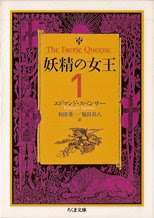その身を固めた頑丈な鎧と銀の盾には
幾多の血腥い戦場のむごい記念の
深くくぼんだ古い打ち傷が残っていたが
武器は今まで一度も振るったことはなかった。
sono mi o katameta ganjouna yoroi to gin no tate ni wa
ikuta no chinamagusai senjou no mugoi kinen no
fukaku kubonda furui uchikizu ga nokotteita ga
buki wa ima made ichido mo furutta koto wa nakatta.
And many trips to many dictionaries later, there is the second sentence of the first stanza. Only four more verse lines to go!
訳しにくい, but I will try to translate:
(rough version)
as for his body hardened by sturdy armor and silver shield
deeply dented old wounds of
the cruel commemorations of many bloody battlefields
remained but
as for his weapons until now he had never swung them.
You may recall the original version:
Y cladd in mightie armes and siluer shielde,
Wherein old dints of deepe wounds did remaine,
The cruell markes of many a bloudy fielde;
Yet armes till that time did he neuer wield:
Japanese syntax isn't always clear to me, and I'll have to think more about what exactly is happening here. Perhaps apposition is not something Japanese easily does, given the string of の-clauses used to translate the second and third lines (in reverse order). I assume the past tense verb 固めた, hardened, is being used in some sort of adjectival (past participial?) sense here and that the に is instrumental. 血腥い, smelling of raw fish or blood, was a real pain in the ass. I'm doubtful it's really a word in that form, and I doubt even more that the average Japanese person can identify 腥 (my friend Sonoko couldn't, at least). The 血 is probably there to reinforce the "bloody" meaning. Again, there are some verbs in kana here that have kanji forms, such as 惨い and 凹んだ. 振るったことはなかった is my first encounter with what I believe to be a Japanese pluperfect. I was genuinely excited to figure this out, though I wonder why the topic particle and not the subject particle is used?
Subscribe to:
Post Comments (Atom)





No comments:
Post a Comment